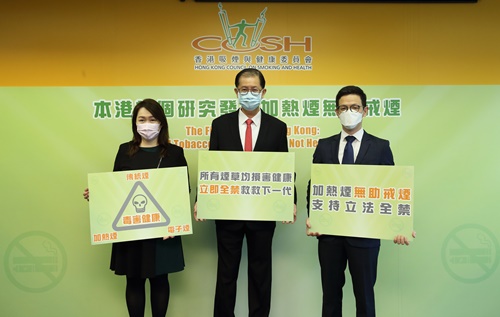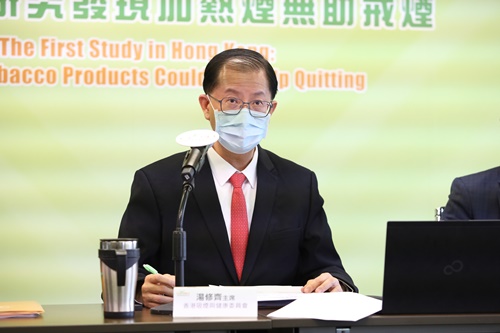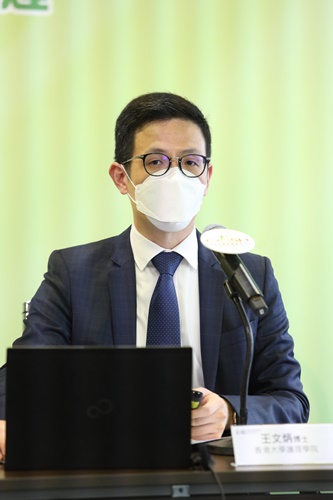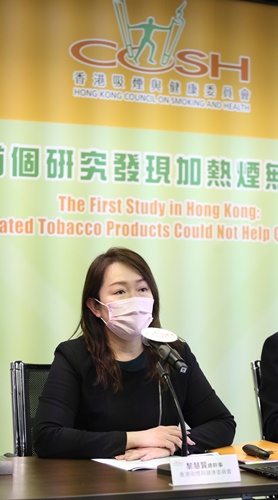Hong Kong Council on Smoking and Health (COSH) held a press conference today (10 December), together with the academia from The University of Hong Kong to announce the results of a local research, which found that heated tobacco products (HTPs) could not help smokers to quit smoking. Meanwhile, speakers also debunked the misleading claims of “Harm Reduction of HTPs” to urge the Legislative Council to pass the Smoking (Public Health) (Amendment) Bill 2019* promptly to enact a total ban on alternative smoking products including electronic cigarettes (e-cigarettes) and HTPs, in order to safeguard public health, particularly for the next generation.
Mr Henry TONG, COSH Chairman said “The misleading claims and sophisticated marketing tactics of tobacco industry in selling HTPs and e-cigarettes had downplayed the health risks associated with smoking and made the public less vigilant on the hazards. The industry attempted to lobby various sectors in support of a regulatory approach on HTPs instead of a total ban. However, the “Harm reduction” claims are misleading and haven’t been approved. Overseas experiences had shown that regulatory approaches on e-cigarettes or HTPs may result in a surge in the prevalence of using alternative smoking products among the youth. Hence, COSH urges the Legislative Council to impose a total ban on all alternative smoking products promptly, including e-cigarettes and HTPs, to nip it in the bud.”
Tobacco industry alleged HTPs could help quitting. COSH reckons the emergence of alternative smoking products only offers a wider range of choices for smokers instead of considering smoking cessation. The University of Hong Kong investigated the prospective association of HTP use and quitting among smokers who had intention to quit in Hong Kong. The smokers were followed up for 6 months. It was the first study to find that HTPs could not help smokers to quit smoking. Dr Kelvin WANG, Associate Professor, The School of Nursing, The University of Hong Kong pointed out that 44% of smokers used HTPs for smoking cessation, eventually the likelihood of successful quitting at six months was not enhanced. In contrast, smokers who used smoking cessation services were 70% more likely to abstain from cigarettes at 6-month follow-up, compared with those who did not use the services. The findings highlight that smokers who need helps for quitting should seek smoking cessation services, which are empirically proved effective, rather than HTPs and other alternative smoking products. The research results had been peer-reviewed and published in an international medical journal.
“Harm reduction” strategy has been adopted in conducting propaganda by the tobacco industry, especially after the Food and Drug Administration (FDA) of the United States allowed the sale of a HTP with “exposure modification” claim in July this year. This strategy had loosened the vigilance on the health risks posed by HTPs and induced people to smoke for maintaining the tobacco business. In fact, the FDA’s decision was based on complete switch from cigarettes to HTPs, but most HTP users smoke cigarettes concurrently. FDA rejected the “risk modification” claim and emphasized that HTPs are neither safe nor “FDA approved”. Ms Vienna LAI, COSH Executive Director shared that World Health Organization also reiterates HTPs are not harmless or less harmful and advises smokers should quit all tobacco use. Besides, some harmful chemicals, including carcinogens, released by HTPs are in higher levels than or absent in cigarette smoke, thus HTPs could be more harmful than conventional cigarettes. The heat produced by the device is hot enough to melt the polymer-film filter of the heat stick, releasing formaldehyde cyanohydrin (rarely found in conventional cigarettes), which is metabolized into formaldehyde and cyanide.
According to COSH’s Tobacco Control Policy-related Survey, HTP use did not help reduce nicotine dependence in conventional cigarette smokers. During the pandemic of COVID-19, 15.5% of exclusive HTP users increase the tobacco consumption at home which is much higher than exclusive conventional cigarette smokers (6.2%). COSH reminds members of the public that tobacco is the main ingredient of HTPs. The products also emit harmful secondhand smoke with toxic chemicals and carcinogens which damage the health of bystanders. The hazards of alternative smoking products should not be underestimated. Use of HTPs at home may expose family members to health risks.
Moreover, a regulatory approach could not stop HTPs from gaining swift popularity among youth. In Korea, the rate of youngsters ever using HTPs hiked to 2.9% in just a year after the product introduction. Even the HTPs are yet to launch in Hong Kong market, the ever use rate of HTPs in secondary school students was 2.3% (about 7,490 students), which could be a major threat on public health if a total ban is not imposed. A number of overseas experiences proved that most HTP users concurrently smoke conventional cigarettes and never smokers were induced to initiate smoking and nicotine addiction. For example, the current use of HTPs rapidly increased by 55 times from 0.2% in 2015 to 11.3% in 2019 in Japan, over 60% concurrently smoke conventional cigarettes. The situation in Italy was also alarming that nearly 740,000 people have tried HTPs in 3 years since its launch. About half (around 330,000 people) were never smokers. Also, another 620,000 non-smokers expressed intention to try.
COSH reiterates that all forms of tobacco products are addictive and hazardous to health, and could not help quitting. If the HTPs are allowed to enter the Hong Kong market, this would inevitably discourage smoking cessation and the products would be appealing to the children and youth. Eventually, the smoking rate might further rebound which poses serious threat on public health and the target in achieving a smoke-free Hong Kong. Therefore, COSH strongly advocates the Government and the Legislative Council to make prompt response on public views by passing the Bill to enact a total ban on all alternative smoking products as soon as possible, and developing a strategy and blueprint for banning conventional cigarettes as well to further reduce the smoking rate for a smoke-free Hong Kong.
* Government proposed the Smoking (Public Health) (Amendment) Bill 2019 to prohibit the import, manufacture, sale, distribution and advertisement of alternative smoking products including electronic cigarettes, heated tobacco products and herbal cigarettes.
COSH and Academia from HKU urged the Government and Legislative Council to pass the Smoking (Public Health) (Amendment) Bill 2019 to enact a total ban on Alternative Smoking Products to safeguard public health.
Mr Henry TONG, COSH Chairman reiterated that a regulatory approach could not stop HTPs from gaining swift popularity among youth.
Dr Kelvin WANG, Associate Professor, The School of Nursing, HKU shared the findings that HTPs could not help smokers to quit smoking.
Ms Vienna LAI, COSH Executive Director debunked the misleading claims of “Harm Reduction of HTPs”.
